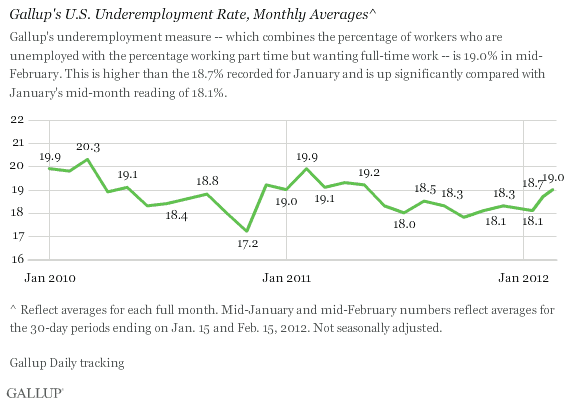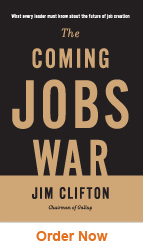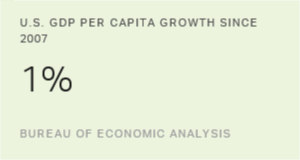With an unemployment rate hovering around 9% and an underemployment rate of 19% according to Gallup, just about all of the presidential candidates have made creating jobs a central plank of their platforms. But everyone is wondering if the candidates' various plans will actually result in creating jobs. According to Gallup Chairman Jim Clifton, there's a simple answer: No.

As Clifton writes in his book The Coming Jobs War, "The government has never, will never, nor should it be expected to ignite badly needed sustainable economic booms. These economic booms originate in the souls of individuals and great cities. Washington exists for law and order, war and peace, infrastructure, social services, and a wide variety of national and international policies that help hold the country together. But don't look there for sustainable, quality, economic growth."
Government can't create jobs, says Clifton, because that's not government's job. Businesses create jobs, and that happens in cities, which means that the solution to the problem of job creation is local. For that reason, job creation efforts should focus on the complicated relationship between companies and cities. It's an organic relationship, but there's a way to cultivate it. Clifton explains how in the following conversation.
GMJ: In your book, you write that Washington is too far away from where job creation happens to effectively promote it. Cities, you write, are what spark job growth. How can cities do that?
Jim Clifton: By aligning every effort around job creation. "Job creation" should be at the center of every leadership conversation. Whenever there's a meeting of the people who run the companies, foundations, and universities, no matter what they're meeting about, job creation needs to be right in the middle of that table.
At the board meeting of the local YMCA, when you're talking about building a Y over here, over there, or somewhere else, I would say, "I know we need a YMCA, but talk to me about how a new facility makes a never-ending contribution to jobs." At every board meeting of every business, ask, "What are we doing for this town that drives quality economic growth or quality job growth?"
Every time the superintendent of schools has a meeting, jobs need to be in the middle of the conversation. And I don't mean jobs for teachers and lunch servers -- I mean how schools are affecting their students' need for a job after graduation. We all must have a conversation that leads to one end, and that end is job creation. The synergy from those conversations will boost the amount of economic energy a town has. If you get that energy up, good things will happen.
GMJ: OK, but when those meetings occur, you often get vague ideas and wishful thinking. For example, people might say something like, "If we build the YMCA here, it'll attract people to the neighborhood, and that might have some impact on building homes, and that equals jobs." Those kinds of conversations don't necessarily involve hard numbers.
Clifton: There are hard numbers a city can use. What I would do is take the Gallup-HOPE Index for your town and ask which of these metrics you're going to drive. This index measures the entrepreneurial energy and financial knowledge of America's young people. For example, the data might show that 70% of the fifth- through 12th-graders in a city might want to have their own business when they grow up. But only 5% of them are in any kind of internship. How can a city increase that number? If you quadruple that 5%, which is the national average, you'll definitely change the future of your town. That number has just got to go up to 20%. Getting that number up to 20% would change the face of this country more than, I think, maybe anything else.
GMJ: Fifth-graders?
Clifton: Absolutely. You need as many people in your city coming out of high school and out of college with the state of mind of entrepreneurship. I think that's the single strongest correlate to quality GDP growth and quality job growth. Getting kids in the state of mind of entrepreneurship is easier than people think.
GMJ: In what way?
Clifton: Because what you're selling is exactly what kids want. They just may not know it yet. You can positively influence young people more than you can adults. To make sure your city has a great future, you need to get to the fifth- through 12th-graders and talk to them about what roles they might play in free enterprise in their towns.
GMJ: What should we be telling them?
Clifton: Kids need to know how business works, because they might not think they're interested in business, but they're definitely interested in making money. Tell them about all the different jobs that are available to them, and then help them figure out a job that they'd have a lot of fun doing. Talk to them about the unbelievable mission that businesses can have in helping develop people -- helping them have a job where they can earn money, where they can be proud of what they do, and where their families can be proud of them too. There needs to be a conversation with those kids about the importance of entrepreneurship. Mentor them.
The real drivers of job creation are local CEOs and philanthropists -- people with a deep emotional investment in their city.
GMJ: What should mentors do with kids?
Clifton: Spend time talking with kids about business. Do not take them to baseball games. Do not take them to the fair. Do not take them out and show them how to putt or hit a baseball. Let them sit in meetings. Let them get a kick out of seeing whatever you're manufacturing. Let them shadow you. Put them in your company and give them real assignments -- you'll be surprised how smart they are. Talk to them about heroes, like Steve Jobs and other businesspeople, who make the world a better place with their companies, who have made themselves better people, who created jobs that let others grow and be proud.
GMJ: What about adults who want to start businesses? Do they need mentors too?
Clifton: Adults -- up-and-coming stars and entrepreneurs -- need a coach, just like a tennis player does. If your city wants to do something brilliant, start a Peace Corps-type program for young businesspeople. Put a hundred seasoned, successful businesspeople with a thousand young entrepreneurs. Let the old-timers mentor the CEOs of small or medium-sized businesses and talk to them about how to increase sales and get more customers.
GMJ: You mention business leaders a lot, but not political leaders. Why?
Clifton: We need stars in government, and we need stars in business. But there's very little a mayor or city council can do to start jobs. The real drivers of job creation are community leaders, what I call "tribal leaders": local CEOs, philanthropists -- people with a deep emotional investment in their city. They typically have a deeper love for their city than they do patriotism for their country. They'd rather die than lose that city. And they know they won't have businesses unless they keep the town going, so they've got a vested interest in their town's economic energy.
When it comes to job creation, nothing positive happens unless the tribal leaders are on board. The tribal leaders have a lot better chance of success in creating jobs than anybody else because they have more of what it takes. They have more talent or connection to talent. They have more influence or connection to influence. They have more money and connection to money. And they just have larger networks. When you get them interested in something that's good for a city, they can get more done.
When you try to fix cities through government, you're digging in the wrong place. You've got to get those tribal leaders together, and you've got to tell them, "Starting jobs is your job. So goes the 20 of us in this room, so goes the city."
GMJ: You talk a lot about behavioral economics in your book. Briefly, how can behavioral economics change a city's state of mind?
Clifton: We could talk about that all day. But here's the short answer: First, there are different constituencies in every city. Let's take fifth- through 12th-graders, since we have been discussing that constituency. A whole bunch of those kids are wound up, and there's economic energy bubbling in their brains now. Get a marker on that, and make sure that you serve it. Get the tribal leaders together and say, "Thirty percent of the kids in this town -- their will is to start their own business or to invent something that changes the world. Five percent of them are in internships. What can we do to help the other kids?" Write a war strategy for those fifth- through 12th-graders.
If you could do just one thing in a city, start with fifth- through 12th-graders, because the war strategy you write for them starts such an incredible conversation. It gets you and everyone else in the city wound up, creating the energy that sustainable job booms demand. Although the fifth- through 12th-graders' jobs war strategy wasn't about you, it becomes you because you can't help but get caught up in it.
-- Interviewed by Jennifer Robison

